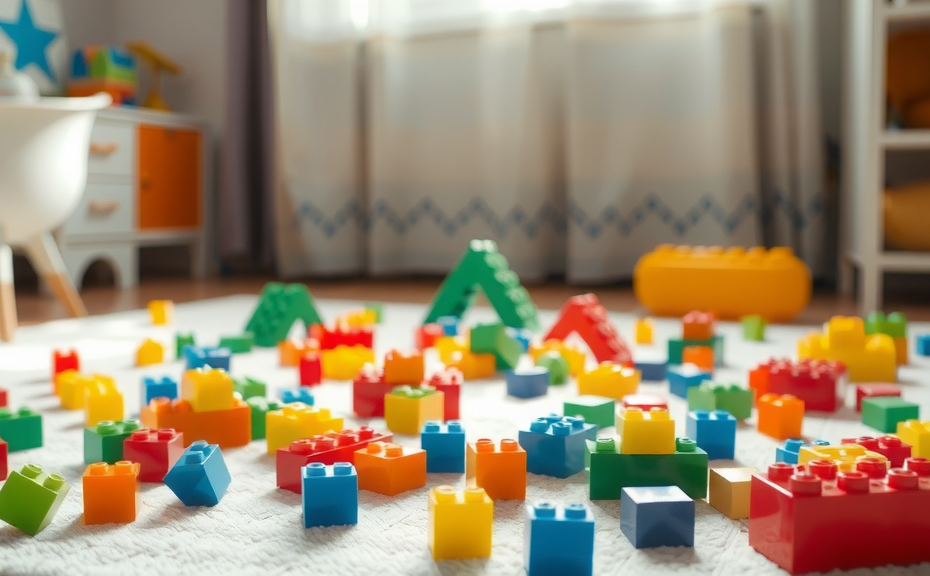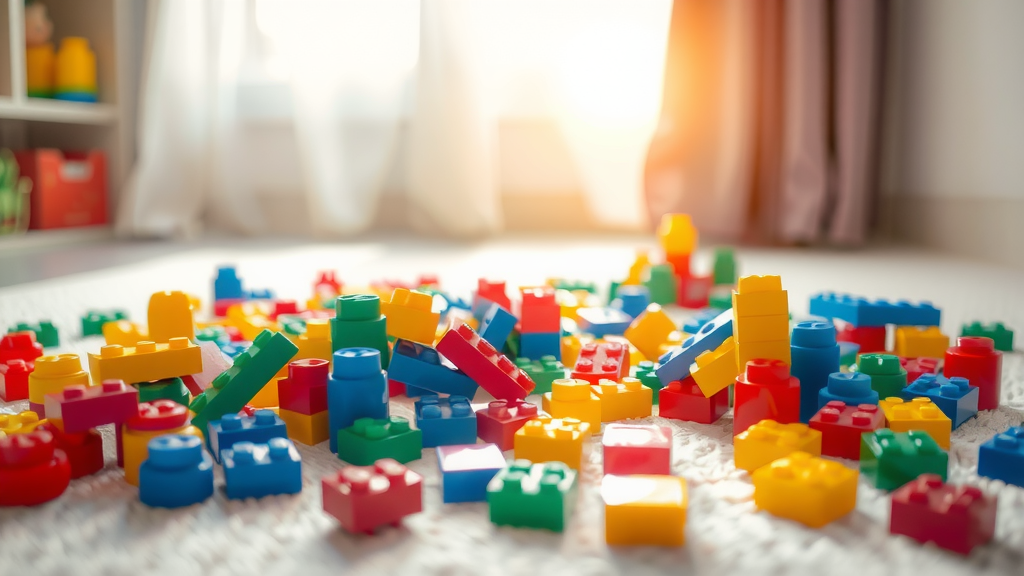Did you know a simple toy can spark endless joy and learning for a child? Beyond being delightful distractions, these items play an important role in a child’s journey of development, helping them explore the world around them. Through engaging play, youngsters can practice problem-solving and sharing with friends.
Each kind of toy offers something special, supporting various areas of growth, from cognitive development to physical coordination.
Creative toys ignite imaginative play, allowing children to express their thoughts and boost their creativity.
In this way, toys become foundational tools for exploration and learning.
Why Are Toys Essential For Development
Engaging with playthings offers children a unique gateway to learning and development. Fostering Imagination: When kids dive into their playtime, they unleash creativity that fuels cognitive growth.
Toys like building blocks or action figures allow for rich storytelling and role-play experiences.
Imagine a child crafting epic adventures with these items, weaving together narratives that sharpen their imaginative skills.
Supporting Social Skills: When kids play together, it’s not just about having fun; it’s an opportunity to learn cooperation and sharing. Group play enhances social skills, enabling children to communicate effectively and work as a team.
Pretend play, where they take on family roles, builds empathy, which is so important for nurturing healthy relationships.
How Do Toys Promote Learning
When it comes to a child’s growth, playtime is much more than just a way to pass the time. It’s a vibrant arena where learning unfolds through interactive experiences.
Toys serve as powerful instruments for cognitive development, engaging children in sensory play that sparks their curiosity.
For instance, those colorful building blocks don’t just look appealing; they also invite young minds to engage in problem-solving as they figure out how to stack them without toppling the tower.
But there’s more to it! Toys also promote interaction among children.
Through roleplaying, they dive into different scenarios, which helps them tune into emotional intelligence by recognizing and responding to the feelings of others. This social aspect of play enhances cooperation and empathy, skills that are invaluable as they grow. With the right choices in toys, learning becomes a joyful adventure, setting the stage for a lifetime of exploration and developing emotional intelligence through roleplaying, problem-solving, sensory play, and rich interaction.
| Aspect of Play | Benefits |
|---|---|
| Cognitive Development | Engages children in problem-solving through toys like building blocks |
| Emotional Intelligence | Roleplaying helps children recognize and respond to others’ feelings |
| Social Skills | Promotes cooperation and empathy among peers |
| Sensory Play | Sparks curiosity and encourages exploration through interactive experiences |
The Role Of Imagination In Play
When kids dive into their playtime, they embark on a journey filled with endless possibilities. Through imaginative scenarios, they can transform into anything they wish—like a superhero saving the day or a chef whipping up a delicious meal.
This engagement not only sparks creativity but also fine-tunes their cognitive skills.
Each little adventure allows them to tackle different situations, boosting their problem-solving and critical thinking abilities.
Emotionally speaking, this type of exploration plays a pivotal role as well.
Role-playing gives children the opportunity to express their feelings and better comprehend the emotions of others. Such nurturing experiences are instrumental in building emotional resilience, helping kids understand social cues and strengthen their connections. So, the next time you observe your child lost in their imaginative world, recognize the vital role of engagement and exploration in their pretend play as it nurtures their fine motor skills.
Enhancing Social Skills Through Toys
Toys serve as a bridge to deeper friendships and important communication skills. When kids dive into cooperative games, whether it’s rolling dice on a board game or constructing something together, they start to build those vital peer interactions.
You can really see the magic happen as they work toward a shared goal, fostering teamwork and learning how to express their thoughts and emotions clearly.
Role-playing toys take it a step further, allowing them to step into different scenarios, which enhances their empathy and understanding.
It’s pretty fascinating to witness how these playful moments shape their world and their relationships with others.
Toys and Social Development
- Cooperative games enhance peer interactions and communication skills among children.
- Engaging in shared goals fosters teamwork and helps children express their thoughts and emotions.
- Role-playing toys promote empathy by allowing children to explore different scenarios and perspectives.
- Playful interactions significantly influence children’s relationships and social understanding.
The Importance Of Motor Skills In Childhood
Think about the joy a child experiences while playing. Toys play a far more significant role than just keeping little ones entertained; they are a gateway to developing vital movement abilities.
Gross and fine movement skills are key for a child’s growth, allowing them to move about and handle objects with ease.
When children hone these abilities, they experience improvements in coordination, balance, and their overall physical health.
Diving into age-appropriate toys fosters hands-on learning that keeps kids engaged.
Take building blocks, for example. They not only strengthen fingers and hands but also enhance spatial awareness.
When kids immerse themselves in play, they gain better control over their movements, which makes daily tasks like writing, dressing, or riding bikes much easier and more enjoyable.
Toys As Tools For Emotional Intelligence
When little ones engage in play, it’s a special time filled with opportunities for them to express and explore their feelings. Have you ever watched your child use their toys to act out various emotions? It’s truly captivating to see how dolls and action figures transform into vehicles for them to mirror their feelings, aiding in recognizing and processing what they’re experiencing.
During these play sessions, cooperative play shines like a beacon of connection.
It not only brings joy but also imparts valuable lessons in empathy.
As kids share their toys and collaborate, they learn to think about others’ emotions, turning their play into a powerful lesson in emotional intelligence.
It’s during these moments of connection that the educational value of toys really comes into play. For instance, role-playing with toys encourages children to navigate complex emotions and situations, all while having fun. They can venture through different scenarios that enhance cooperative play, educational value, physical activity, cultural relevance, and parental involvement.
| Aspect of Play | Benefits |
|---|---|
| Emotional Expression | Children use toys to act out and process their feelings. |
| Cooperative Play | Encourages sharing and empathy among children. |
| Role-Playing | Helps navigate complex emotions and situations while having fun. |
| Parental Involvement | Enhances the educational value of play through engagement. |
Encouraging Creativity With Educational Toys
Imagine a child taking a cardboard box and turning it into a spaceship, complete with buttons and lights. This kind of magic often comes to life through engaging playtime experiences.
When kids dive into activities with creative resources, they begin to explore concepts and experiment with their imaginations.
Collaborative play with building blocks or art supplies becomes a canvas for discovery, allowing them to express themselves and communicate their ideas in vibrant ways.
Each session is an opportunity for them to develop problem-solving skills, confidence, and emotional attachment to their creations. Through this playful journey, toys transform into invaluable tools for learning and personal growth.
Transitioning from the joy of discovery, it’s fascinating to see how these enriching experiences contribute to emotional intelligence.
When children engage with others during play, they learn to navigate feelings and build connections, crucial to their development. The exploration of attachment and self-expression through discovery, utilizing toys as tools, fosters collaborative play among children.
Why Parental Involvement Matters In Play
Have you ever paused to think about how much those moments spent playing with your child really mean? They’re more significant than you might believe. When parents dive into play, it fosters a sense of independence in kids and lays the groundwork for emotional growth.
With your support, children feel more confident as they take on new challenges.
While engaging in shared play, they’re sharpening their critical thinking skills, tackling problems hand-in-hand with you.
Plus, choosing gender-neutral toys opens up a world of sensory exploration, encouraging little ones to venture beyond traditional roles. Participating in their play isn’t just about having a good time; it’s a meaningful way to shape their development and help them understand the world around them.
So, how can you keep that balance during play? It’s all about being present while allowing space for them to explore on their own, fostering their independence, confidence, and critical thinking skills through sensory exploration with gender-neutral toys.
Play and Child Development
- Engaging in play with children enhances their emotional development and independence.
- Shared play experiences improve children’s confidence when facing new challenges.
- Critical thinking skills are developed through problem-solving during playtime.
- Gender-neutral toys promote sensory exploration and break traditional gender roles.

